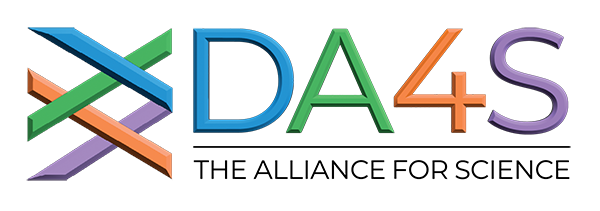MEMBERSHIP Eligibility
Membership is only available to corporations and small and, or diverse-owned suppliers in the life sciences industry who directly support drug discovery and drug research, as well as promote innovation in the life sciences industry as detailed below in the “Membership Categories.” The Board, at its sole discretion, may reject an application for membership or elect not to renew a membership, if in its view the applicant does not meet the criteria outlined herein. DA4S reserves the right to cancel a membership at any given time at its own discretion.
At this time, we are not accepting Membership applications from staffing companies.
Membership is non-refundable.
MEMBERSHIP CATEGORIES
➢ Agencies
➢ Animal Suppliers
➢ Biology Services
➢ Biomarkers Analysis Chemical Synthesis
➢ Biometrics
➢ Biotech Support Services
➢ Business Development
➢ Call Centers
➢ Chemicals
➢ Clean Room Operations and Maintenance
➢ Cleaning Agents
➢ Clinical Data Management
➢ Clinical Monitoring
➢ CMO
➢ Comparator Drugs
➢ Construction
➢ Contract Manufacturing
➢ CRO
➢ Data Acquisition
➢ Data Analytics
➢ Devices
➢ Digital Marketing
➢ Distribution
➢ DNA/RNA Extraction
➢ Drug Discovery
➢ Engineering Services
➢ Equipment
➢ Facility Services
➢ Fleet
➢ Functional Consulting
➢ Health, Welfare & Compensation Benefits
➢ IRB
➢ IS Software, Hardware & Maintenance
➢ IT Consulting
➢ Lab Consumables & Support Services
➢Legal Services
➢Management Consulting
➢ Market Research
➢ Media
➢ Medical Writing
➢ Medicinal Chemistry
➢ Meetings and Events
➢ MRO
➢ Packaging & Containers
➢ Patient Recruitment
➢ Pharmacokinetic Services
➢ Print & Fulfillment
➢ Raw Materials & Manufacturing Consumables
➢ SasS
➢ Sales Support
➢ Scientific Services
➢ Site Pricing & Payments
➢ Stability Testing
➢ Staff Augmentation
➢ Strategic Branding and Creative
➢ Technology Services
➢ Telecom
➢ Temporary Labor
➢ Training
➢ Translation Services
➢ Transportation
➢ Travel
➢ Trial Management
➢ Utilities
Members in Good Standing. To be a member in good standing, a member must pay annual membership dues.
Removal of Members. Members will be removed if annual dues are not paid 15 days after due date. You will need to re-apply for membership and are not guaranteed approval.
DA4S reserves the right to revoke membership at any time.
Membership: Corporation or Supplier?
Who is considered a CORPORATION?
A corporation within DA4S is defined as business that procures, sources and supports diverse suppliers who provide LIFE SCIENCE OR HEALTHCARE RELATED PRODUCTS OR SERVICES.
Corporations represent America’s largest publicly-owned, privately-owned and foreign-owned companies, and their purchasing activity is national and international in scope. These companies represent pharmaceutical, bio-tech, hospitals, universities, government institutes and other life-sciences or healthcare buying entities.
Typically, a corporation has senior-level commitment to supplier diversity, buyers are engaged and measured by their performance, people are developed both internally and externally, and they strive to provide sponsorship and training for diverse suppliers. Corporations with a world-class supplier diversity program understand that supplier diversity provides them with a return on investment.
Who is considered a SUPPLIER?
A supplier within DA4S is a business providing LIFE SCIENCE OR HEALTHCARE RELATED PRODUCTS OR SERVICES that qualifies as a disadvantaged-owned small business, minority-owned business, women-owned business, HUBZone business, small business, service-disabled veteran-owned business, certified LGBTQ-owned business.
DA4S defines diverse suppliers per the guidelines of the National Minority Supplier Development Council, the Women’s Business Enterprise National Council and the U.S. Small Business Administration.
National Minority Supplier Development Council: A minority-owned business is a for-profit enterprise, regardless of size, physically located in the United States or its trust territories, which is 51% owned, operated and controlled by minority group members, defined from the following:
- Asian-Indian – A U.S. citizen whose origins are from India, Pakistan or Bangladesh.
- Asian-Pacific – A U.S. citizen whose origins are from Japan, China, Indonesia, Malaysia, Taiwan, Korea, Vietnam, Laos, Cambodia, the Philippines, Thailand, Samoa, Guam, the U.S. Trust Territories of the Pacific or the Northern Marianas.
- African American – A U.S. citizen having origins in any of the Black racial groups of Africa.
- Hispanic – A U.S. citizen of Hispanic heritage, from any of the Spanish-speaking areas of the following regions: Mexico, Central America, South America or the Caribbean Basin only.
- Native American – A person who is an American Indian, Eskimo, Aleut or Native Hawaiian, and regarded as such by the community of which the person claims to be a part.
Women’s Business Enterprise National Council: A Woman-Owned Business Enterprise is an independent business concern that is at least 51% owned and controlled by one or more women who are U.S. citizens or Legal Resident Aliens; whose business formation and principal place of business are in the US or its territories; and whose management and daily operation is controlled by one or more of the women owners.
U.S. Small Business Administration: As defined by the Small Business Act, a small business concern is “one that is independently owned and operated and which is not dominant in its field of operation.”
- Small Business — Depending on the industry, ‘small’ is defined by either the number of employees or average annual receipts of a business concern. Website reference for size standards by NAICS code is https://www.sba.gov/federal-contracting/contracting-guide/size-standards.
- Small Disadvantaged Business – A small business that is at least 51 percent owned, operated and controlled by one or more individuals who are both socially and economically disadvantaged.
- Woman-Owned Business – A small business that is at least 51% owned, operated and controlled by a woman or women.
- Economically Disadvantaged Woman-Owned Business – A small business that is at least 51% owned and controlled by one or more women who are economically disadvantaged. Presumed economically disadvantaged includes stipulations on net worth, yearly income, and assets. For specifics, go to https://www.sba.gov/business-guide/grow-your-business/women-owned-businesses#id-funding-for-women-owned-small-businesses.
- Veteran-Owned Business – A small business that is at least 51% owned, operated and controlled by one or more veterans.
- Service-Disabled Veteran-Owned Business – A small business that is at least 51% owned, operated and controlled by one or more veterans with a service-connected disability.
